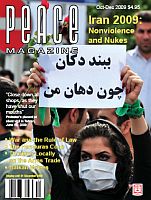
Peace Magazine Oct-Dec 2009, page 31. Some rights reserved.
Search for other articles by PMag staff here
A group of political and military leaders, led by Des Browne, a former defence secretary, will seek to rally European support for a US-led initiative to work toward nuclear abolition. It proposes radical, co-ordinated cuts in the arsenals of existing nuclear states, in an effort to persuade emerging powers to forgo such weapons.
The group will be called the Top Level Group of UK Parliamentarians for Multilateral Nuclear Disarmament and Non-Proliferation, and as well as Browne will bring together former Labour ministers Margaret Beckett, John Reid and Lord Robertson; senior Tories including Malcolm Rifkind and Michael Ancram; and three former chiefs of the defence staff, General Lord Guthrie, Field Marshal Lord Inge and Admiral Lord Boyce. It will also include Lady Williams, the prime minister's adviser on nuclear proliferation.
British Prime Minister Gordon Brown has deferred the design work for replacing Britain's Trident nuclear deterrent until after the next election. The first crucial decision required to build a new generation of nuclear submarines had been due this September. Officials said that Britain wants a world without nuclear weapons and, in principle, the decision to replace Trident will be reversed if other countries disarm.
Source: The Telegraph
On August 19, 2009, the Costa Rica Congress passed the Bill creating the Ministry of Justice and Peace and becomes the third country to have such a Minister. The others are Nepal and the small Pacific island nation of the Solomon Islands.
Source: Peace Alliance
In a well-attended event held on May 12/09 on Parliament Hill, Development and Peace delivered 38 boxes filled with postcards addressed to Prime Minister Harper and signed by more than 140,000 people, coast-to-coast across Canada. They called on the Canadian government to implement legal mechanisms to hold Canadian mining companies accountable for their actions abroad.
Belgian Senator Philippe Mahoux is preparing a bill that would ban the use, production and stockpiling of nuclear weapons. Belgium has already become the firstcountry to ban cluster and depleted uranium munitions.
Belgium is not a nuclear power, but it is a NATO member and does have U.S. tactical nuclear weapons deployed on its territory.
Should Mahoux's bill pass and the three-point ban go into effect, such nuclear weapons stored on Belgian military bases would no longer be welcome.
The Federation of American Scientists believes there are 10 to 20 American B61 model nuclear bombs at the Kleine-Brogel Belgian Air Force Base in the north of the country, which would likely be carried to targets by Belgian F-16 warplanes should they be deployed. These arrangements would have to be revised should Mahoux's bill pass into law.
Both the Belgian Senate and House of Representatives passed a resolution in 2005 calling for the gradual withdrawal of US tactical nuclear weapons, and as the argument for disarmament heats up worldwide there is a very good chance Mahoux's nuclear ban bill will pass.
Belgium is not the only European country with U.S. tactical nuclear arms on its soil; the Netherlands, Germany, Italy and Turkey are also hosts to the weapons. However, should the nuclear ban go into effect in Belgium, there is a good chance that other countries will begin moving in the same direction.
Source: Mainichi Daily News
One result of the victory of the opposition Democratic Party in Japan's parliamentary elections of August 30 will be a strengthening of the campaign for a nuclear weapons-free world.
In the past few years, Japan's long-ruling conservatives -- grouped in the misnamed Liberal Democratic Party (LDP) -- had shown increasing signs of dispensing with Japan's nuclear-free status. Pointing to North Korea's development of a nuclear capability, party officials had publicly floated the idea of Japan's acquiring nuclear weapons.
But the stunning victory by Democratic Party of Japan (DPJ), with its sharply antinuclear stand, has altered this situation dramatically. Pointing to the nation's "Three Non-Nuclear Principles," a 1967 government pledge not to possess, manufacture, or introduce nuclear weapons into Japan, the DPJ leader promised to work to codify these principles into law.
Source: Lawrence Wittner, Foreign Policy in Focus.

Peace Magazine Oct-Dec 2009, page 31. Some rights reserved.
Search for other articles by PMag staff here